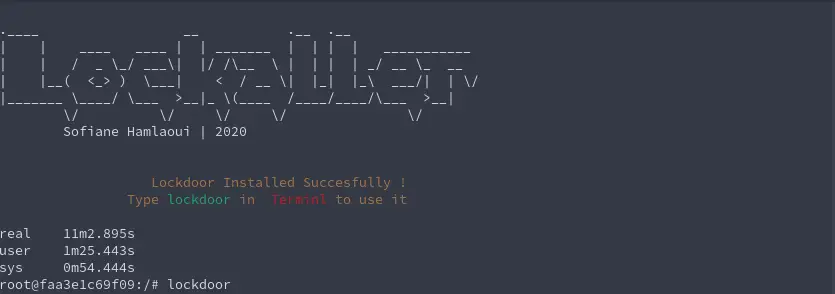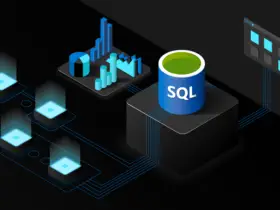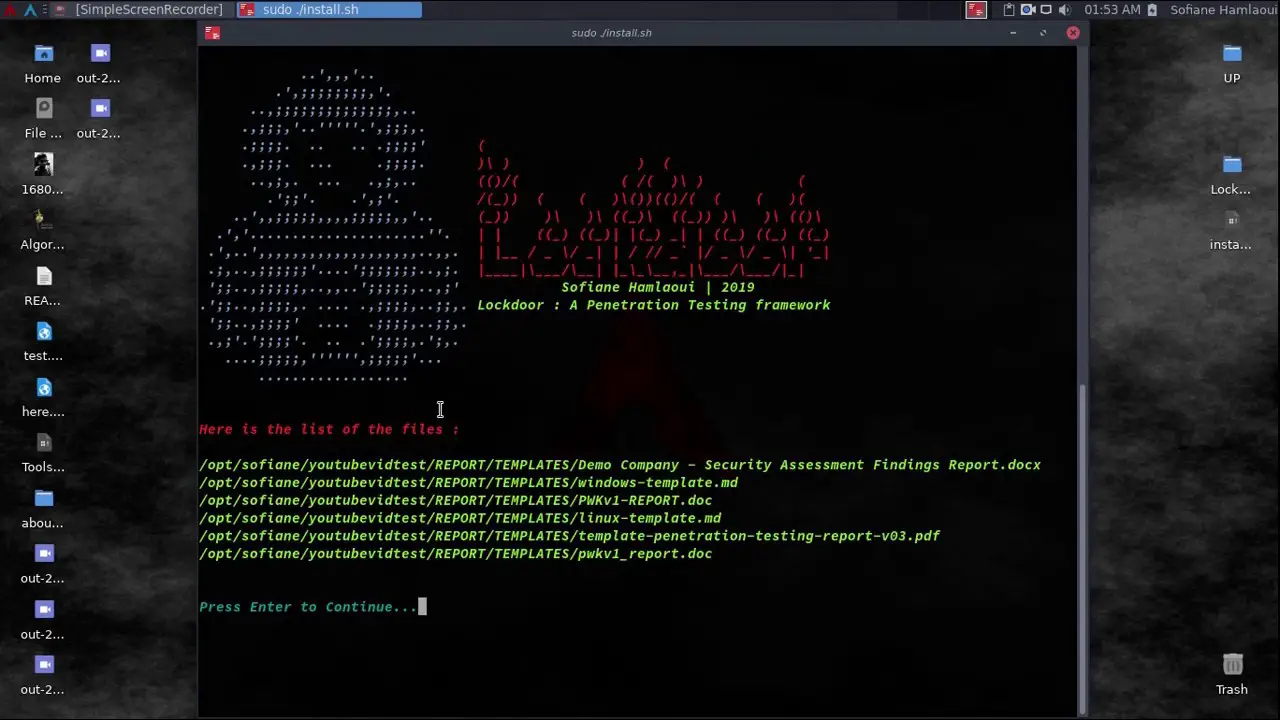

Lockdoor Framework : A Penetration Testing framework with Cyber Security Resources
Changelog
Version v2.3 IS OUT !!
- Fixing some CI
- making a more stable version
- new docker iaage build
- adding packages for each supported distros
Versions
06/2021 : 2.3
- Config file checking.
- Updating the tools.
- Showing the current version of Lockdoor by -v arg.
- checking the version and asking for possible update.
- Making it easier to customize.
- No added tools for the moment.
- Fixing the docker misconfiguration, the docker version now works perfectly.
- Information Gathring Tools (21)
- Web Hacking Tools(15)
- Reverse Engineering Tools (15)
- Exploitation Tools (6)
- Pentesting & Security Assessment Findings Report Templates (6)
- Password Attack Tools (4)
- Shell Tools + Blackarch’s Webshells Collection (4)
- Walk Throughs & Pentest Processing Helpers (3)
- Encryption/Decryption Tools (2)
- Social Engineering tools (1)
- All you need as Privilege Escalation scripts and exploits
03/2020 : 2.2.3
- Information Gathring Tools (21)
- Web Hacking Tools(15)
- Reverse Engineering Tools (15)
- Exploitation Tools (6)
- Pentesting & Security Assessment Findings Report Templates (6)
- Password Attack Tools (4)
- Shell Tools + Blackarch’s Webshells Collection (4)
- Walk Throughs & Pentest Processing Helpers (3)
- Encryption/Decryption Tools (2)
- Social Engineering tools (1)
- All you need as Privilege Escalation scripts and exploits
- Working on Kali,Ubuntu,Arch,Fedora,Opensuse and Windows (Cygwin)
Video Demo
Overview:
LockDoor is a Framework aimed at helping penetration testers, bug bounty hunters And cyber security engineers. This tool is designed for Debian/Ubuntu/ArchLinux based distributions to create a similar and familiar distribution for Penetration Testing. But containing the favorite and the most used tools by Pentesters. As pentesters, most of us has his personal ‘ /pentest/ ‘ directory so this Framework is helping you to build a perfect one. With all of that ! It automates the Pentesting process to help you do the job more quickly and easily.
Features
Pentesting Tools Selection
- Tools: Lockdoor doesn’t contain all pentesting tools , let’s be honest ! Who ever used all the Tools you find on all those Penetration Testing distributions ? Lockdoor contains only the favorite and the most used tools by Pentesters.
- what Tools: the tools contains Lockdoor are a collection from the best tools on Kali,Parrot Os and BlackArch. Also some private tools from some other hacking teams like InurlBr, iran-cyber. Without forgetting some cool and amazing tools I found on Github made by some perfect human beings.
- Easy customization: Easily add/remove tools.
- Installation: You can install the tool automatically using the installer.sh , Manually or by running the Docker Image.
Resources and cheatsheets
- Resources: That’s what makes Lockdoor, Lockdoor Doesn’t contain only tools ! Pentesing and Security Assessment Findings Reports templates, Pentesting walkthrough examples and templates and more.
- Cheatsheets: Everyone can forget something on processing or a tool use, or even some tricks. Here comes the Cheatsheets role ! there are cheatsheets about everything, every tool on the framework and any enumeration,exploitation and post-exploitation techniques.
Demo







Installation
The recommended way to use Lockdoor is by pulling the Docker Image so you will not have to worry about dependencies issues.
A Docker image is available on Docker Hub and automatically re-built at each update:A Docker image is available on Docker Hub and automatically re-built at each update:
https://hub.docker.com/r/sofianehamlaoui/lockdoor
It is initially based on the official debian docker image (debian).
- Docker Installation
- Installing requirments sudo apt install docker < Debian-based distributions sudo dnf install docker < RPM-based distributions sudo pacman -S docker < Arch-based distributions sudo zypper install docker < OS-based distributions sudo yum install docker < RH-based distributions
- Running the container 1. *Pull lockdoor Docker Image:* sudo docker pull sofianehamlaoui/lockdoor 2. *Run fresh Docker container:* sudo docker run -it –name lockdoor-container -w /Lockdoor-Framework –net=host sofianehamlaoui/lockdoor 3. *Run Lockdoor Framework* sudo lockdoor 4. *To re-run a stopped container:* sudo docker start -i sofianehamlaoui/lockdoor 5. *To open multiple shells inside the container:* sudo docker exec -it lockdoor-container bash
- Using LockAller – Lockdoor Installer
Installing it using the script may take some time depends on the packages already installed on your system. > here you can find a fresh installation on a new debian distro with no pre-installed packages : [11min]

Lockdoor Tools contents
Information Gathering
- Tools:
- dirsearch : A Web path scanner
- brut3k1t : security-oriented bruteforce framework
- gobuster : DNS and VHost busting tool written in Go
- Enyx : an SNMP IPv6 Enumeration Tool
- Goohak : Launchs Google Hacking Queries Against A Target Domain
- Nasnum : The NAS Enumerator
- Sublist3r : Fast subdomains enumeration tool for penetration testers
- wafw00f : identify and fingerprint Web Application Firewall
- Photon : ncredibly fast crawler designed for OSINT.
- Raccoon : offensive security tool for reconnaissance and vulnerability scanning
- DnsRecon : DNS Enumeration Script
- Nmap : The famous security Scanner, Port Scanner, & Network Exploration Tool
- sherlock : Find usernames across social networks
- snmpwn : An SNMPv3 User Enumerator and Attack tool
- Striker : an offensive information and vulnerability scanner.
- theHarvester : E-mails, subdomains and names Harvester
- URLextractor : Information gathering & website reconnaissance
- denumerator.py : Enumerates list of subdomains
- other : other Information gathering,recon and Enumeration scripts I collected somewhere.
- Frameworks:
- ReconDog : Reconnaissance Swiss Army Knife
- RED_HAWK : All in one tool for Information Gathering, Vulnerability Scanning and Crawling
- Dracnmap : Info Gathering Framework
Web Hacking
- Tools:
- Spaghetti : Spaghetti – Web Application Security Scanner
- CMSmap : CMS scanner
- BruteXSS : BruteXSS is a tool to find XSS vulnerabilities in web application
- J-dorker : Website List grabber from Bing
- droopescan : scanner , identify , CMSs , Drupal , Silverstripe.
- Optiva : Web Application Scanne
- V3n0M : Pentesting scanner in Python3.6 for SQLi/XSS/LFI/RFI and other Vulns
- AtScan : Advanced dork Search & Mass Exploit Scanner
- WPSeku : WordPress Security Scanner
- Wpscan : A simple WordPress scanner written in python
- XSStrike : Most advanced XSS scanner.
- Sqlmap : automatic SQL injection and database takeover tool
- WhatWeb : the Next generation web scanner
- joomscan : Joomla Vulnerability Scanner Project
- Frameworks:
- Dzjecter : Server checking Tool
Privilege Escalation
- Tools:
- Linux
 :
:- Scripts :
- linux_checksec.sh
- linux_enum.sh
- linux_gather_files.sh
- linux_kernel_exploiter.pl
- linux_privesc.py
- linux_privesc.sh
- linux_security_test
- Linux_exploits folder
- Scripts :
- Windows |Windows| :
- windows-privesc-check.py
- windows-privesc-check.exe
- MySql :
- raptor_udf.c
- raptor_udf2.c
- Linux
Reverse Engineering
- Radare2 : unix-like reverse engineering framework
- VirtusTotal : VirusTotal tools
- Miasm : Reverse engineering framework
- Mirror : reverses the bytes of a file
- DnSpy : .NET debugger and assembly
- AngrIo : A python framework for analyzing binaries ( Suggested by @Hamz-a )
- DLLRunner : a smart DLL execution script for malware analysis in sandbox systems.
- Fuzzy Server : a Program That Uses Pre-Made Spike Scripts to Attack VulnServer.
- yara : a tool aimed at helping malware researchers toidentify and classify malware samples
- Spike : a protocol fuzzer creation kit + audits
- other : other scripts collected somewhere
Exploitation
- Findsploit : Find exploits in local and online databases instantly
- Pompem : Exploit and Vulnerability Finder
- rfix : Python tool that helps RFI exploitation.
- InUrlBr : Advanced search in search engines
- Burpsuite : Burp Suite for security testing & scanning.
- linux-exploit-suggester2 : Next-Generation Linux Kernel Exploit Suggester
- other : other scripts I collected somewhere.
Shells
- WebShells : BlackArch’s Webshells Collection
- ShellSum : A defense tool – detect web shells in local directories
- Weevely : Weaponized web shell
- python-pty-shells : Python PTY backdoors
Password Attacks
- crunch : a wordlist generator
- CeWL : a Custom Word List Generator
- patator : a multi-purpose brute-forcer, with a modular design and a flexible usage
Encryption – Decryption
- Codetective : a tool to determine the crypto/encoding algorithm used
- findmyhash : Python script to crack hashes using online services
Social Engineering
- scythe : an accounts enumerator

























Leave a Reply